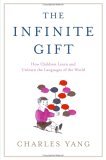language acquisition – “The Infinite Gift” by Charles Yang
Written on September 8, 2007
 The Infinite Gift: How Children Learn and Unlearn the Languages of the World
The Infinite Gift: How Children Learn and Unlearn the Languages of the World by Charles Yang
principles and parameters theory –
“First, there is a set of universal principles, like the principle of structure dependence, that all languages obey. These principles lay out the bounds on how words are put together into phrases, phrases into sentences, and how phrases can (and cannot) move around in sentences. The principles are innate and don’t have to be learned: they explain the absence of the impossible errors like the linear rules that all children steer clear of…..
Second, the differences among languages can be very compactly described by about a few dozen parameters. Learning a language becomes a problem of “twenty questions”: the child needs only to fix the values of the parameters, and that’s it. Now the main thesis, and the subtitle of the book, will make sense. The process of picking parameter values for grammar learning can be given a familiar name: natural selection. The child tries out various options in the parameter system, which turn up as “errors” in her speech: these imperfections actually belong to perfect languages in universal grammar, just not the one she eventually learns. These wrong options, however, cannot last forever; a Bostonian child trying out the parameter values for Japanese will not generally understand English or be understood. Only the grammar actually used in the child’s linguistic environment will not be contradicted, and only the fittest survives. In other words, children learn a language by unlearning all other possible languages.” (p. 31)
categorical perception – the ability to distill a continuous range of signals into discrete units. (p 41) (ex. color perception, speech perception)
variational learning – start with all possible grammars, only the target language persists (p 157)
“parameters that are expressed by more sentences in the environment will be learned faster, because their competitors will be punished more often” (p 171)
Filed in: cognitive science,culture.



ann magnusson…
I Googled for something completely different, but found your page…and have to say thanks. nice read….